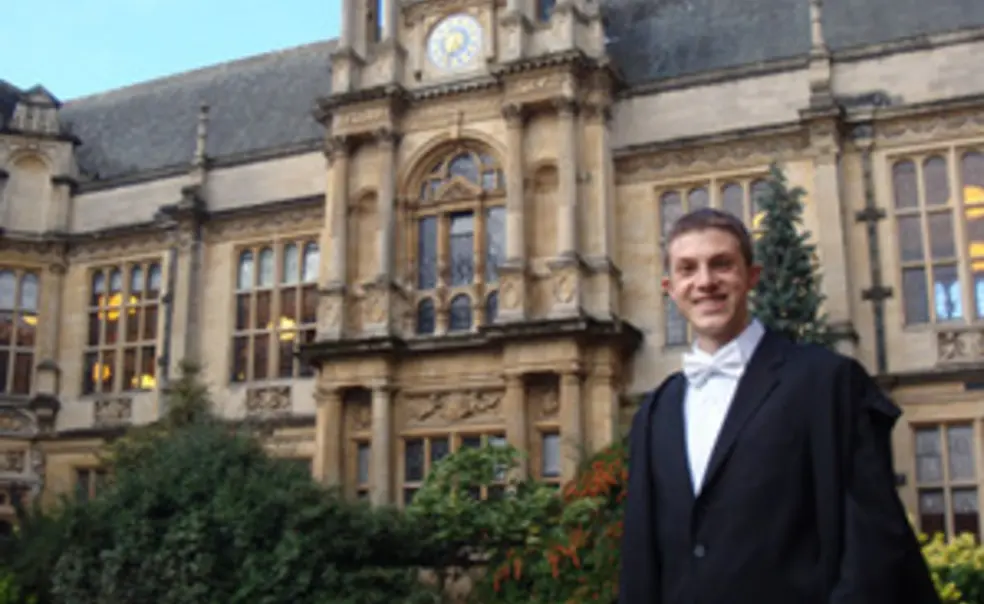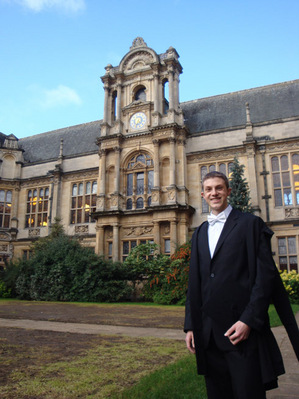Princeton's Rhodes scholars find time to explore
Rhodes scholar Henry Barmeier '10 at Oxford. (Photo: Courtesy Henry Barmeier)
When Princeton’s Rhodes scholars headed off to Oxford, they expected to find historic buildings, world-class scholars, and the intellectual tools with which to tackle some of the world’s most complex problems. But they got one thing they hadn’t bargained for: free time.
“I just have so much time to use however I want,” Henry Barmeier ’10 said. “My perception of time is radically different [from before].”
For Barmeier, one of the greatest luxuries of the Rhodes experience has been an abundance of time for unstructured learning outside of the classroom. He has used the space in his schedule to learn the guitar, visit art museums, and have long conversations with friends.
“I feel more at liberty now to pursue interests for no other reason than because they’re interesting,” he explained. “That really is the heart and soul of the Oxford experience for me: a shift in what I think it means to learn.”
Scott Moore ’08, a D.Phil. candidate in politics, said he felt his Oxford lifestyle was a good departure from the pressurized, harried culture at Princeton.
“Compare Firestone’s opening hours with those of the Oriental Studies Institute at Oxford, where I did much of my research: 9 a.m. until 6:45 p.m.” he said in an email. “That’s right, you can’t do any work after 6:45 p.m. even if you wanted to. How healthy!”
Nick DiBerardino '11, left, and Timothy Nunan '08. (Photos: Courtesy Nick DiBerardino and Timothy Nunan)
While each of Princeton’s recent Rhodes scholars is engaged in a specific field of study, they seem to have found common ground in Oxford’s emphasis on independent study and self-organization, as opposed to the deadline-heavy culture of structured schedules that they remembered at Princeton. Even at the graduate level, coursework requirements are generally “a fact of life” in the U.S., according to Moore; at Oxford, much of the degree consists of the student’s own research and projects. Khameer Kidia ’11 noted that while he has to turn in weekly essays for his master’s degree in medical anthropology, he still manages to attend academic lectures in other departments and open talks during his spare time.
“The downside, though, is that the methodological training is not as rigorous, and you don’t get much support in terms of academic advising or research funding as you would in the U.S.,” Moore said. Mark Jia ’10 also said that his faculty advisers at Princeton had been significantly engaged with his academic work, whereas Oxford’s faculty and resources have been more difficult to access.
For some, the unstructured nature of the Oxford academic experience has meant a newfound sense of self-awareness, and the occasional challenge of staying productive in the absence of external pressure.
“In the American system, we structure ourselves around incentives,” Nick DiBerardino ’11 said. “It’s amazing to have to face yourself and suddenly change your structure of motivation, and look inside and say ‘what is it that I want to do?’”
Most of the scholars also said that stimulating conversations have been a precious resource at Oxford, with many describing the experience of talking with friends at pubs about current events well into the early morning. Timothy Nunan ’08 said that he has appreciated the diverse academic backgrounds and career aspirations of his Oxford peers, while Jia said he enjoys Oxford’s culture of long talks over drinks or dinner.
“The bottom line is that this experience is so much more than learning academic skills – 95 percent of the experiences I’ve had here have been enriching almost because they have no immediate bearing to my career aspirations,” Barmeier said. “It’s learning about how to live well.”















No responses yet